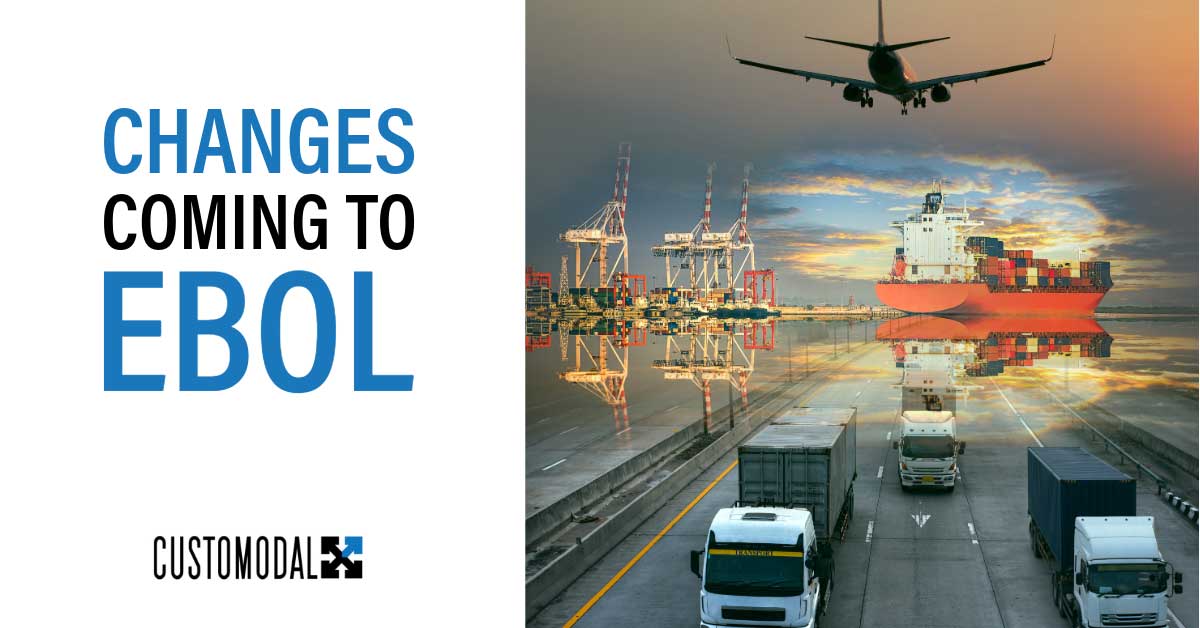Changes to eBol: What to Know
An eBol is an important document in the logistics world. In August 2024, significant changes were anticipated to the electronic Bill of Lading (eBOL) in the less-than-truckload (LTL) industry. The industry is moving towards adopting a standardized eBOL format, which aims to replace the various digital platforms (and manual ones) currently in use. This standardization is spearheaded by the National Motor Freight Traffic Association’s (NMFTA) Digital LTL Council.
➜ Customodal is your go-to guide in the freight industry! We’re the experts in efficiencies and savings and can help you navigate the complexities of your operations. Discover all the amazing benefits we offer – get started today!
Unfortunately, as the logistics industry approaches the end of July 2024, it’s clear that the journey toward widespread adoption of the electronic Bill of Lading (eBOL) has been uneven across major carriers and players in the Less-than-Truckload (LTL) space. Despite a collective commitment to go live with eBOL by August 2024, each carrier’s progress has varied significantly.
At its core, the eBOL standardizes the fields included in the Bill of Lading, ensures uniformity in the entries for each field, and provides a map to integrate these fields into the carrier’s dispatch management system. However, the implementation details differ across carriers. Some carriers still rely on manual data entry to populate these standardized fields—a choice that undermines the efficiency gains promised by eBOL and represents a significant investment with no immediate payoff.
The real efficiency gains from eBOL come when carriers move from manual data entry to importing shipment data directly from logistics providers or shippers. This shift offers tangible savings and operational efficiencies. Unfortunately, most carriers have yet to tackle this critical step.
It’s important to note that whether a BOL is regular or electronic, incomplete or incorrect information will lead to the same issues—billing changes and service failures. The potential of eBOL lies in its ability to streamline processes and reduce errors, but this potential remains largely untapped as carriers navigate the complexities of implementation.
Why a Standardized eBol is Beneficial
The transition to a standardized electronic Bill of Lading (eBoL) would bring several significant changes to the logistics and shipping industry. Key benefits include increased efficiency, enhanced security through digital signatures and encryption, improved accessibility and speed of document exchange, and cost savings by reducing the need for physical storage and paper use.
Additionally, eBoL supports real-time tracking, faster document processing, reduced risk of errors, and is legally accepted in many jurisdictions. These advancements aim to streamline operations and promote sustainability in global trade (Propel Apps).
Key benefits of the new eBOL standard include:
- Increased Efficiency: The standardized eBOL will streamline the transmission of bill of lading data, making the process more accurate and reducing administrative costs and errors.
- Real-Time Visibility: The new system will allow for real-time tracking updates and predictive estimated times of arrival (ETAs), enhancing the ability to detect and avoid disruptions during transit.
- Improved Communication and Service: With a unified digital format, communication between shippers, carriers, and logistics providers will be more efficient, improving overall service quality.
The industry-wide adoption of the new eBOL standard was expected to be fully operational in August 2024, but time will tell.
➜ Customodal is your go-to guide in the freight industry! We’re the experts in efficiencies and savings and can help you navigate the complexities of your operations. Discover all the amazing benefits we offer – get started today!
Reach out today:


